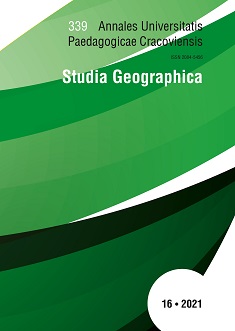Impact of restrictions related to the pandemic on sport and recreational activity and health behavior of Tourism and recreation students at the Pedagogical University of Krakow
DOI:
https://doi.org/10.24917/20845456.16.4Abstract
The appearance of the SARS-CoV-2 coronavirus in 2019 and the rapid spread of the coronavirus, has become the reason for the WHO to announce many restrictions related to the
movement of the population, gathering and use of sports and recreational infrastructure. Most schools and colleges have switched to hybrid or fully on-line learning. Limited access to sports facilities along with home isolation, which additionally adversely affects the mental state of students, motivation to work and study, has caused a change in some elements of their lifestyle. The article presents the results of a survey conducted among students of Tourism and
Recreation at the Pedagogical University of Krakow, concerning the impact of a pandemic on the level of their sports and recreational activity, changes in their diet and health-related habits. According to the survey, the majority of students, despite the fact that they started to pay
more attention to their health, significantly reduced or completely ceased their sports and recreational activities, and most of them also increased the supply of food, especially unhealthy one. There is a need for further education in the field of a healthy lifestyle, the ability to use available internet tools and portable sports equipment to maintain or improve general physical fitness necessary to maintain health.
References
Bochenek, A., Grabowiec, A. (2013). Odżywianie i aktywność fizyczna jako elementy stylu życia młodzieży licealnej. Lubelski Rocznik Pedagogiczny, t. XXXII.
Dayton, J., Ford, K., Carroll, S., Flynn P., Kourtidou S., Holzer R., (2021). The Deconditioning Effect of the COVID‑19 Pandemic on Unaffected. Pediatric Cardiology. Pozyskano z: https://www.medscape.com/viewpublication/8241 [dostęp: 30.01.2021].
Gardocka-Jałowiec, A., Śleszyńska-Świderska, A., Szalonka, K. (2021). Wpływ SARS-CoV-2 na konsumpcję leków OTC w Polsce, http://repozytorium.uni.wroc.pl/Content/118598/PDF/02_05_A_GardockaJalowiec_A_Sleszynska-Swiderska_K_Szalonka_Wplyw_SARS-
-CoV-2_na_konsumpcje_lekow.pdf [dostęp: 01. 02. 2021].
Gruszczyńska, M., Bąk-Sosnowska, M., Plinta, R. (2015). Zachowania zdrowotne jako istotny element aktywności życiowej człowieka. Stosunek Polaków do własnego zdrowia. Hygeia Public Health, 50(4), 558-565.
Górska-Kłęk, L., Mełeszko, K., Boerner, K. (2011). Prozdrowotne elementy stylu życia studentów Akademii Wychowania Fizycznego i Uniwersytetu Ekonomicznego. Acta Bio-Optica et Informatica Medica, 4, vol. 17.
Heitzman, J. (2020). Wpływ pandemii COVID-19 na zdrowie psychiczne. Psychiatria Polska, 54(2): 187-198.
Kiczuk, K., Czerwińska-Pawluk I. (2012). Rodzaje zachowań zdrowotnych a stan zdrowia. W: R. Muszkieta (red.) Człowiek w świecie zdrowia, sportu i ekonomii. Poznań: Wielkopolska Wyższa Szkoła Turystyki i Zarządzania, 6.
Komunikat z badań CBOS „Zdrowie online” Nr 100/2020, Warszawa 2020. Pozyskano z: www.cbos.pl [dostep: 07.02. 2021].
Mata, J., Wenz, A., Rettig, T., Reifenscheid, M., Moehring, K., Krieger, U., Naumann, E. (2020). Health behaviors and mental health before and during the COVID-19 pandemic: A longitudinal population-based survey. Pozyskano z: https://doi.org/10.31234/osf.io/qbgh7
[dostęp: 10.02.2021].
Nowakowska, E., Sulimiera-Michalak, S. (2020). COVID-19 - Choroba wywołana zakażeniem wirusem SARS-CoV-2 globalnym zagrożeniem dla zdrowia publicznego, Postępy Mikrobiologii - Advancements of mMcrobiology, 59(3), 227-236.
Olszanecka-Glinianowicz, M. i wsp. (2020). List do Redakcji. Leczenie nadwagi i otyłości w czasie pandemii i po jej zakończeniu. Nie czekajmy na rozwój powikłań - nowe wytyczne dla lekarzy. Psychiatria Polska, 54(6), 1263-1268.
Parfin, A., Wdowiak, K., Furtak-Niczyporuk, M., Herda, J., (2019). Wpływ izolacji społecznej na poziom aktywności fizycznej oraz samopoczucie i stan psychiczny ludzi podczas pandemii koronawirusa COVID-19. Pol J Public Health, 129(4), 127-131.
Raport z badań: Polacy o swoim zdrowiu oraz prozdrowotnych zachowaniach i aktywnościach. (2012). Warszawa, CBOS. Pozyskano z: www.cbos.pl [dostęp: 02.02. 2021].
Slavcheva-Hinkova, P., Bozhkova, A. (2020). Study students and sports activity during the state of emergency due to Covid-19. Trakia Journal of Sciences, 18, Suppl. 1, 707-712.
Sokół-Szawłowska, M. (2021). Wpływ kwarantanny na zdrowie psychiczne podczas pandemii COVID-19. Psychiatria, 18(1), 57-62.
Susłow, W., Królokowski, T., Planowanie miejsc pracy osób uczących się za pośrednictwem Sieci. Pozyskano z: www.researchgate.net [dostęp: 14.02.2021].
Szczygielska, A. (2020). Aktywność fizyczna Polaków w czasie pracy zdalnej - prezentacja wyników badań empirycznych. Bezpieczeństwo Pracy. Nauka i Praktyka, 9, 22-26.
www.ceneo.pl [dostęp: 12.02.2021].
www.gov.pl/web/premier/premier-wprowadzamy-stan-epidemii-w-polsce [dostęp:12. 02.2021].
www.mindshareworld.com/poland/news/jak-koronawirus-zmienil-zwyczaje-zakupowe polakow-badanie-mindshare-polska [dostęp: 20.01.2021]
www.who.int [dostęp: 09.02. 2021].
www.WHO_NMH_NPH_PAH_03.2.pdf [dostęp: 30. 01. 2021]
Downloads
Published
Issue
Section
License
The submission of a paper to be published is synonymous with an agreement to transfer the copyright free of charge from the author to the publisher. The author also agrees to permit the publisher to publish the paper in printed form, open access online form, digital library form and other digital platforms with which the publisher has or will have a publishing agreement. Furthermore, the author agrees to not limit the number of copies that may be printed or issued by the publisher. In the case of co-authored papers, it is assumed that the corresponding author is authorized to represent the remaining co-authors in this respect. Authors are requested to sign a copyright declaration.

